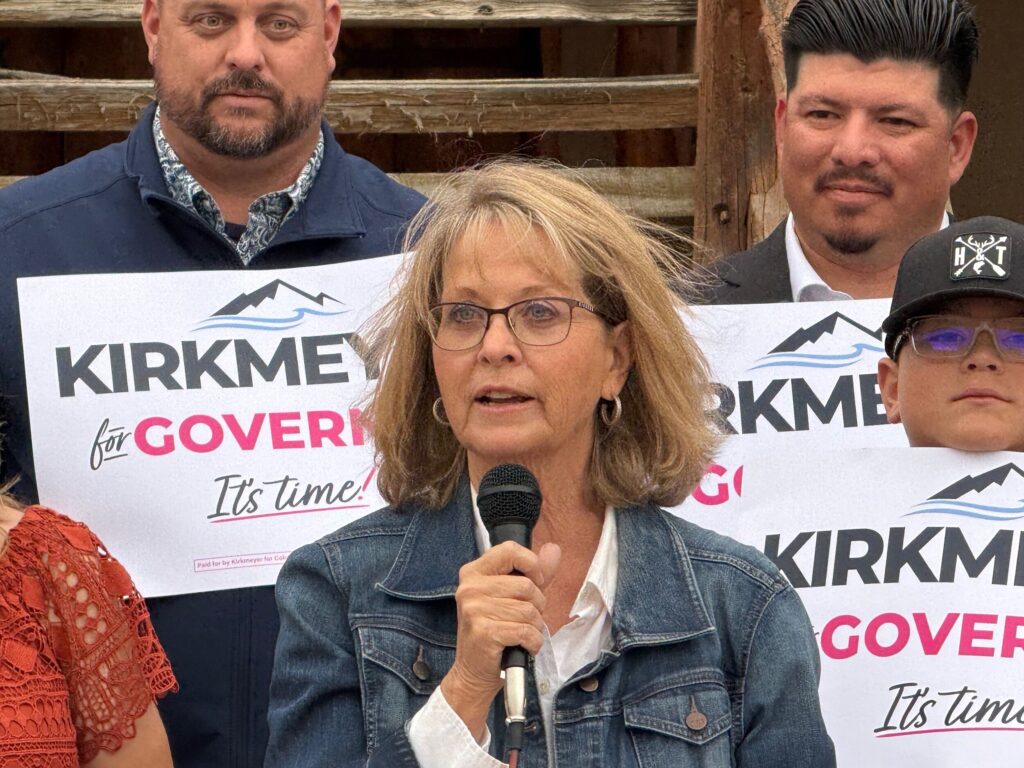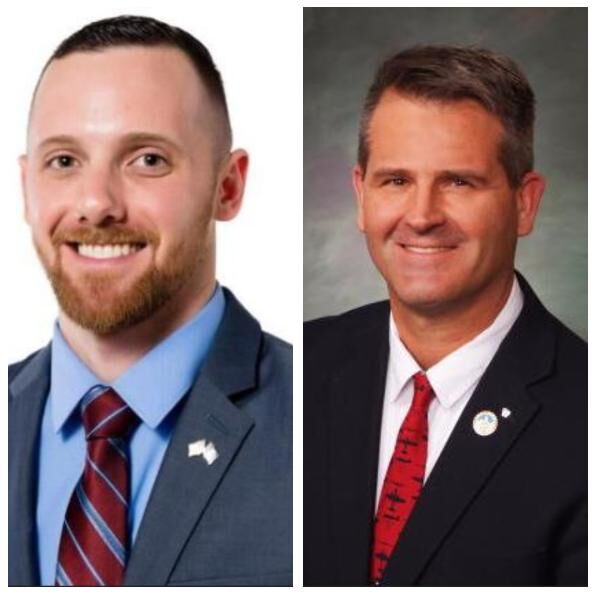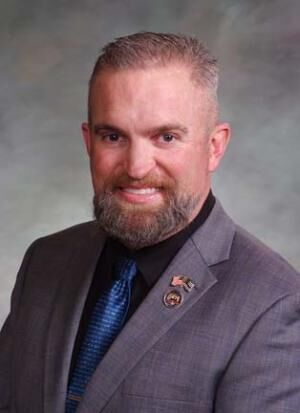Q&A with Sen. John Cooke | Minority leader on getting things done and forging friendships

After nearly eight years as a Colorado state senator, John Cooke is leaving elected office with no plans of returning.
Cooke concluded his last legislative session in May, facing an impending term limit this January. Since entering the Senate in 2015, the Greeley Republican served as majority whip, assistant minority leader and was promoted to head minority leader in May.
A former three-term sheriff of Weld County, many of Cooke’s legislation revolved around law enforcement, such as increasing penalties for driving under the influence and funding police support and training. But he also branched into other issues, including his bills to expand in-state tuition to homeless youth and create a pilot program to help people with intellectual disabilities go to college.
This year, Cooke passed an over $30 million grant program to fund “smart policing” efforts and spearheaded the session-defining bill aiming to address the fentanyl crisis in Colorado.
With his time as Senator coming to an end, Cooke sat down with Colorado Politics to talk about his career and why some of his biggest achievements were the relationships he made along the way.
Colorado Politics: Your background is in law enforcement, including being the sheriff of Weld County before you were elected. What drew you to politics initially?
Sen. John Cooke: I was always interested in politics. I went to my first Republican caucus in Jefferson County at age 18 and I got elected to be a delegate to the county assembly. I’ve always been part of the Weld County Republican Party and I was part of College Republicans at the University of Northern Colorado. When I graduated from UNC, I worked at the police department there. I did four years at Breckenridge and then went to Weld County. I got involved in the Weld County Republican Party and said, “I’m going to become sheriff someday.” So, I worked on local campaigns and national campaigns to get my name out there, to get the support of the Republicans here. Then when it came time to run for sheriff, I did my own campaign. When I was done with that, the senator before me, Scott Renfroe, was term-limited and people came to me and said, “Have you thought about running for the Senate?” I talked it over and decided it’d be a good fit. I wasn’t done serving Weld County. I still had a lot to give.
CP: When you first got to the Senate, what did you want to accomplish?
Cooke: I wanted to make sure victims had a voice and I wanted to make sure law enforcement had a voice. I was the only one there that had any real law enforcement experience and I always cared about victims’ rights over the rights of criminals. But I also wanted to expand into other things. I didn’t want to be pigeonholed as the guy who runs victim bills or law enforcement bills. So, I ran a couple of education bills – some of the bills I’m most proud of are the two education bills I ran. I wanted to branch out, learn a little about a lot and a lot about a little. I wanted to represent my district. I wanted Weld County to be able to have a voice down there at the Capitol.
CP: During your time in office, you were minority leader, assistant minority leader and majority whip. How did you rise through the ranks?
Cooke: I think leadership. Being in law enforcement, you have to, one, have a command presence and, two, work up the ranks as sergeant, lieutenant, captain, undersheriff, that type of thing. I had the leadership experience and that helped a lot. I think people in my caucus recognized that leadership ability and so they trusted me to be the whip after only two years, and then the assistant minority leader when we lost the majority. They saw the hard work and dedication that I had to the job and thought that I’d be good at it.
CP: You’ve been known to work across the aisle as a senator. This session, 91% of the bills you prime-sponsored had bipartisan sponsorship. Tell me about that.
Cooke: Well, every bill that I primed or co-primed passed except for one. It goes back to when Republicans were in the majority. When one party controls one chamber and the other controls the other, you have to work together. We were the majority during my first four years in the Senate, and if you wanted to get something done, you had to work with a House member and vice versa. You formed these relationships. The other side of the aisle, they’re not my enemy. I like most of them and we get along well. If they have a good idea or I have a good idea, we’re able to come together and work out the details. For my smart policing bill, Sen. Janet Buckner was working on something close, so we worked together to combine them. It builds true relationships, camaraderie and trust that you can come up with a bill that benefits the state of Colorado. I think bipartisanship is a good thing. We’re not going to compromise on our core values – I never did that – but if there was a bill to benefit Colorado and I had to give a little bit and they had to give a little bit, it comes out better in the long run.
CP: Did that ever cause any difficulties for you with members of your own party who are more on the far end and don’t like to compromise?
Cooke: We didn’t have much of that in the Senate. In the House, that would’ve been an issue, but most of us in the Senate are pretty open. If somebody has a bill that the rest of us didn’t like, they’re going to say, “Look, there’s this bill that’s important to me, I’m working with some Democrats, feel free to vote no.” And that’s what we did. We each have our own thoughts and philosophies and we don’t try to lock down the other person. If a bill is really important to another member, we try to support them, even though we may not like the bill. We’re able to get things done that way. It was pretty harmonious, for the most part.
CP: Looking back on the 2022 session, how did it compare to your previous sessions? Was it different in any way?
Cooke: It was a little different. My first three years of the minority were pretty rough. We sued the Senate president and won. It was really contentious, those first three sessions. This one wasn’t as bad. I love law enforcement, the greatest profession on earth, and the previous session was a lot of taxes on law enforcement and a lot of anti-law enforcement bills. But this year, even Democrats can read polls and they realize now that the rhetoric of defunding the police and all that is not a winning strategy. So, I think they backed off quite a bit this session. It was a little bit more law enforcement friendly and not as friendly to criminals as it could have been.
CP: What was your biggest accomplishment this session? Of course, you were one of the prime sponsors of the fentanyl bill, which became one of the biggest issues of the whole year.
Cooke: Right, that was a huge accomplishment. I would say, though, I really liked my smart policing bill. I started working on that right when the session before last was finished. To be able to work it through and have some Democrats say, “This is a great bill, we want to be on it,” and then to be able to help fund law enforcement in recruiting and training, and even pay part of their salaries to help recruit minority candidates to work in communities that reflect them, it was a pretty big accomplishment. That’s what I’m proudest of. Getting the fentanyl bill through was a little more difficult because members on both sides hated it. Everybody dug in their heels. Some were saying it goes too far, others were saying it doesn’t go far enough. And so, to get to the compromise that we came to, it worked out really well. That was a huge accomplishment, as well. I think it was good for Colorado and gave law enforcement the tools they need, and also gave harm reduction a lot of money for education and training. So, yeah, I would say those two are my biggest accomplishments.
CP: What was your biggest disappointment from the session?
Cooke: I’m 100% pro-life and I believe in pro-life. So, to see the abortion bill come through the way it is, to me, was very disappointing. Even running that bill was disappointing and then having it pass was a huge disappointment. There was no need for it. It’s just hugely disappointing.
CP: You also mentioned that one of your bills didn’t make it through this session.
Cooke: Yeah. It was to clarify the Air Quality Control Commission, the procedures on their hearings. The crazy left environmentalists didn’t like it, so the Democrats killed it in committee. It wasn’t totally unexpected. We ran it last year and we listened to what some of the Democrats said about it. We changed it and worked with a lot of people and came back with their suggestions. I don’t think people understood it. They just thought it was a crazy Republican anti-environmental bill, which it wasn’t, but that’s what it was portrayed as. So, they killed it. It wasn’t unexpected. Senate President Bill Cadman during my first year here would say, “Carry your bills, don’t marry them,” and I learned from that. If I’ve ever had a bill die, I never got upset about it.
CP: What other lessons did you learn during your time as a Senator?
Cooke: I learned a lot of lessons about the process. In Weld County, I had over 350 employees working for me and after I got elected to the Senate, I thought, “Man, am I qualified for this?” And within about a week I thought, “I’m overqualified for this.” But I did learn. As sheriff, you say, “Do this,” and it gets done. Down here, you’re one of 100. You say, “Do this,” and you hear, “Oh, sorry we don’t do it that way,” or, “We’ve tried that before and it doesn’t work.” So, I learned a lot about the process. I learned that maybe I don’t always have the best ideas. I learned that you have to work with the other side quite a bit and that’s a good thing. Sometimes compromise is the best thing.
CP: Did you accomplish what you set out to as a senator? Do you have any regrets?
Cooke: I think I accomplished quite a bit. I think Colorado is a safer place for some of the bills I’ve ran. I didn’t accomplish everything, I had bills die. My first year, I ran the repeal of the magazine ban, and of course that died in the House. So, I didn’t accomplish everything, but I didn’t expect to accomplish everything. I have no regrets. I believe things happen for a reason and I just move forward. I have no regrets about anything I’ve done.
CP: Do you have any favorite moments or memories from your time in office?
Cooke: Oh my God, there were so many. Getting my first bill passed, that was a good moment. But just, you know, the friendships outside of the building. I remember during my first couple of years, myself and Senate President Bill Cadman, Sen. Kevin Grantham and Sen. Ellen Roberts, we said, “Let’s get out of here,” and we went bowling and had a great time. It’s those kinds of memories that I cherish the most. The friendships, the relationships you build. Going across the street when City Grille was still there, having dinner and a drink with a lobbyist or a Republican or even a Democrat. Those are my favorite memories. Bills come and go, but those relationships will last forever.
CP: What do you plan to do next? Do you intend to stay involved in party politics at all?
Cooke: A little bit, especially up through this election. My goal as the minority leader is to win back the Senate for the Republicans and for the state of Colorado. So, I’m going to be involved in that. Then after January, who knows? I’ve served my community and I’ve done my time. So, after January, I don’t know. I might just travel, play golf, relax and work in my garden. I’ll see how long that goes and then reevaluate and maybe get back involved. I’m not running for anything ever again. I got a lot of pressure to run for the new congressional district and I decided I’m done. I’m not going to run for anything. I might get back involved but I’m going to relax and enjoy life for a little bit first.
CP: Is there anything that you’re going to miss about being a senator?
Cooke: That’s a tough one. Again, I think just the people, the relationships. I’m not going to miss the chaos. You know, I take that back. The chaos sometimes is rewarding. It’s stressful, but it’s a good kind of stress. I might miss a little bit of that. But I’ll miss my fellow senators and interacting with them, especially if we take back the majority.
CP: And do you think Republicans will take back the Senate?
Cooke: Oh yeah, I do. I think we got a good shot.
FAST FACTS
Age? 65, some people say going on 13.
Where did you grow up? Born in San Juan, Puerto Rico. Moved to Arvada, Colorado at age 6.
Family? Wife, Amy, is the CEO of the John Locke Foundation, son is a petroleum engineer in Denver and daughter is a civilian air force employee in Idaho. Also has a 14-year-old grandson, a 12-year-old granddaughter, two sisters and a mother who still lives in Arvada.
Favorite restaurant in Greeley? Kenny’s Steak House and Hunan Chinese Restaurant.
Any hobbies? Golf, gardening and making pizza with home-made dough and pizza sauce made with ingredients from my garden.
Something about you most people don’t know? I belong to the sons of the American Revolution. My great grandfather eight times was named John Bailey, he was a silversmith living in New York and he made George Washington’s battle sword that he carried throughout the revolution.













